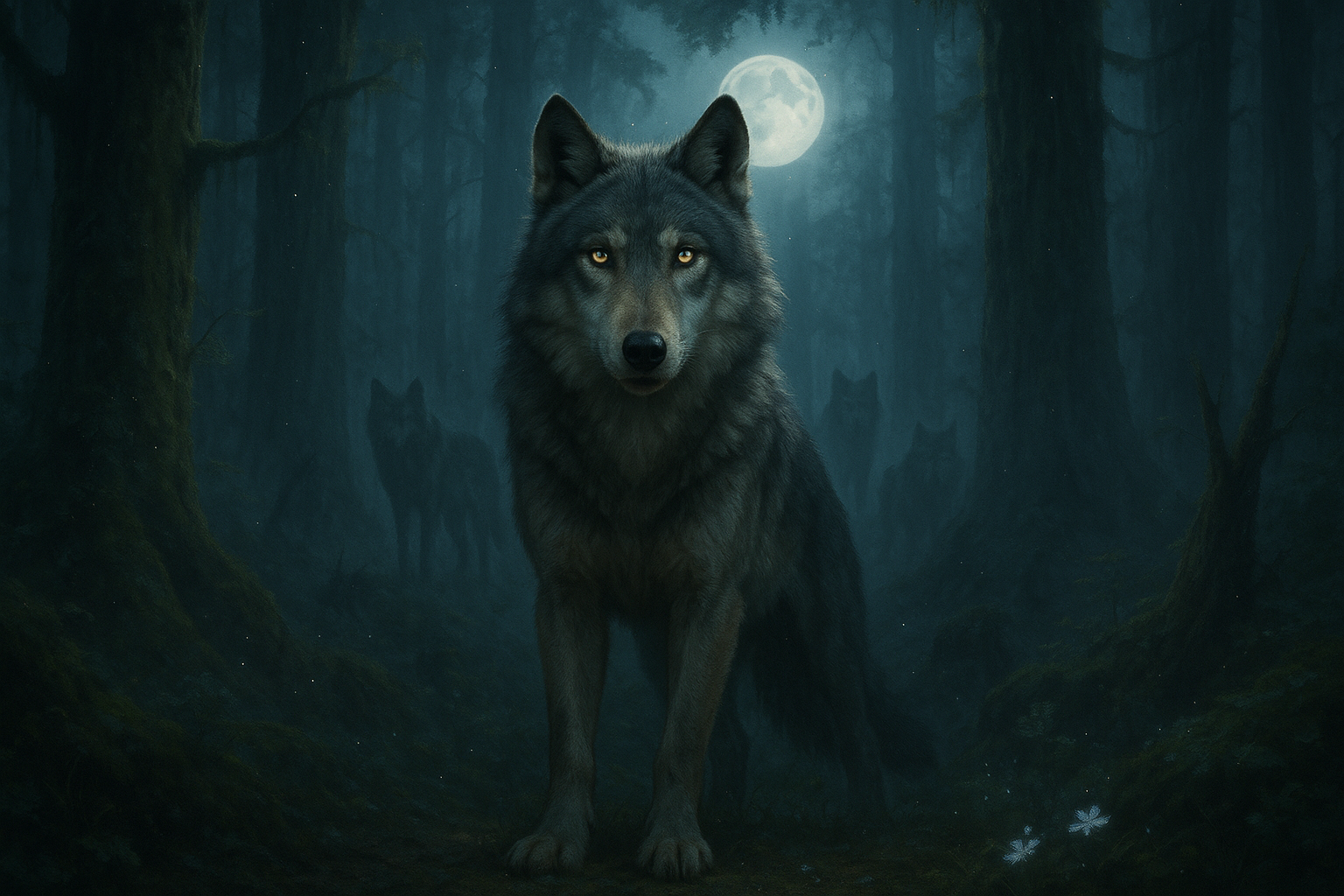Wolves have long captivated the human imagination, weaving their way through myths and legends across cultures and centuries. Their piercing eyes and haunting howls evoke a sense of mystery and allure, positioning them as both feared predators and revered spiritual symbols. 🌕 In this exploration of wolves as guardians of the spiritual realm, we will delve into the multifaceted roles these majestic creatures play in folklore and spirituality, and how they continue to influence our perception of the natural world.
For centuries, wolves have been central figures in mythologies worldwide. From the fierce Fenrir of Norse legend to the nurturing she-wolf of Roman lore, these animals are depicted as powerful entities that embody a spectrum of traits and values. They are often seen as protectors, guides, and symbols of transformation. But why have wolves been cast in these roles, and what do they reveal about the cultures that created these stories? By examining these narratives, we gain insight into the symbolic significance of wolves and their impact on human spirituality.
The symbolic journey begins in the icy landscapes of Scandinavia, where the Norse myths depict Fenrir, a monstrous wolf destined to play a crucial role in the apocalypse, known as Ragnarök. Fenrir’s tale is a narrative of prophecy, fear, and fate, highlighting the dual nature of wolves as both destructive and transformative forces. His story prompts us to consider themes of balance and duality in our own lives, encouraging a deeper reflection on the forces we perceive as chaotic and the potential for rebirth they hold.
Meanwhile, in the warm hills of ancient Italy, the legend of Romulus and Remus tells of a she-wolf who nurtured the founders of Rome. This narrative positions the wolf as a maternal figure, emphasizing protection, community, and survival. It challenges us to rethink the wolf’s image as a mere predator, inviting us to appreciate the nurturing aspects that are often overshadowed by their fierceness. The she-wolf serves as a reminder of the complex interplay between strength and compassion.
Further afield, Native American tribes have long revered wolves as powerful spiritual entities and teachers. Many tribes view the wolf as a symbol of loyalty, courage, and communication, and often regard these animals as guides on spiritual journeys. 🐺 The lessons drawn from wolf behavior encourage us to embrace community, value family bonds, and trust in our instincts. In this light, wolves emerge as exemplars of the deep connections that bind us to one another and to the natural world.
As we navigate the intricate web of wolf mythology, it becomes clear that these creatures resonate with our innate desire for connection and understanding. They bridge the tangible and the spiritual, inviting us to explore the unseen forces that shape our existence. Wolves challenge us to confront our fears, honor our instincts, and embrace transformation.
This article will traverse the rich tapestry of wolf myths and legends, unraveling the symbolic roles these animals play across different cultures. We will examine how wolves are perceived in contemporary spirituality and explore their significance in modern ecological contexts. By understanding the enduring allure of wolves, we can better appreciate their role as spiritual guardians and their impact on our lives and beliefs.
Join us on this journey into the mystical realm of wolves, where ancient tales meet contemporary reflections, and the call of the wild resonates within us all. Together, we will uncover the secrets of these majestic creatures and celebrate their timeless legacy as guardians of the spiritual realm. 🌲

Conclusion
Sure, here’s a sample conclusion for your article:
Conclusion: Embracing the Mystical Legacy of Wolves
Throughout this exploration of wolves as guardians of the spiritual realm, we have traversed a path rich with history, mythology, and cultural significance. From ancient legends to modern-day interpretations, wolves have consistently represented a bridge between the natural and spiritual worlds, embodying qualities such as loyalty, wisdom, and strength. 🌟
We began by delving into the historical perspectives, examining how various cultures across the globe revered wolves. Whether as protectors, guides, or symbols of transformation, these majestic creatures have played a pivotal role in the spiritual narratives of societies, serving as a testament to their profound impact on human consciousness. As seen in Native American folklore, wolves are considered sacred animals that possess the ability to teach and guide humans, offering lessons in community and perseverance.
In addition to their cultural and spiritual significance, wolves also contribute to the ecological balance of their habitats. As apex predators, they help maintain the health and diversity of ecosystems, showcasing the intricate connections between all living things. This ecological role further enhances their symbolic representation as guardians, emphasizing the importance of preserving these creatures in the wild. 🌿
The myths and legends surrounding wolves are not mere stories of the past but are living traditions that continue to inspire and guide us. They challenge us to reflect on our own lives, encouraging us to embrace our instincts, foster our connections with nature, and seek balance in our environments. The wolf’s howl serves as a reminder of the beauty and mystery that exist within the natural world, inviting us to listen and learn.
As we conclude our journey through the mystical world of wolves, it is important to acknowledge their relevance in contemporary society. In a time when environmental conservation and cultural appreciation are more crucial than ever, understanding the symbolic and ecological roles of wolves can inspire actions that protect and honor these magnificent creatures. 🌍
We invite you, dear reader, to reflect on the insights shared in this article. Consider how the myths and legends of wolves resonate with your own life experiences and beliefs. How might you apply the lessons of the wolf to your personal and spiritual growth? We encourage you to share your thoughts and stories in the comments below. 🗨️
Additionally, if you found this exploration meaningful, please share it with others who might also appreciate the rich tapestry of wolf mythology. By spreading awareness and fostering discussions, we can collectively enhance our understanding of these awe-inspiring guardians of the spiritual realm.
For further reading and research on the cultural significance of wolves, consider exploring the following resources:
- World Wildlife Fund – Wolves
- Sierra Club – Living with Wolves
- History.com – History of the Wolf
In closing, let us honor the legacy of wolves, not only as creatures of the wild but as enduring symbols of spiritual and ecological wisdom. May their stories continue to inspire and guide us in our journey through life. 🌌
Thank you for embarking on this exploration with us. We look forward to hearing your thoughts and engaging in meaningful conversations about these fascinating beings.
This conclusion aims to encapsulate the main points discussed in the article while emphasizing the significance of wolves in both spiritual and ecological contexts. It encourages readers to engage with the content and share it further, fostering a community of interest around this topic.
Toni Santos is a symbolic researcher and esoteric scholar specializing in the study of animal symbolism in spiritual traditions, hidden alphabets and ciphers, numerological systems of antiquity, and the geometric patterns that connect the cosmos to sacred art. Through an interdisciplinary and mystical-focused lens, Toni investigates how humanity has encoded divine knowledge, cosmic order, and spiritual mystery into symbols — across cultures, myths, and secret teachings. His work is grounded in a fascination with symbols not only as visual forms, but as carriers of hidden meaning. From ancient numerological wisdom to totemic creatures and sacred geometric codes, Toni uncovers the visual and symbolic tools through which cultures preserved their relationship with the spiritual unknown. With a background in esoteric semiotics and sacred tradition history, Toni blends visual analysis with archival research to reveal how symbols were used to shape identity, transmit memory, and encode sacred knowledge. As the creative mind behind imansy.com, Toni curates illustrated symbol studies, esoteric pattern analyses, and spiritual interpretations that revive the deep cultural ties between animals, hidden scripts, and forgotten wisdom. His work is a tribute to: The sacred meaning of Animal Symbolism in Spiritual Lore The encrypted systems of Hidden Languages and Secret Alphabets The ancient calculations of Numerology in Ancient Traditions The universal design language of Sacred Geometry and Cosmic Patterns Whether you're a spiritual seeker, symbolic researcher, or curious gatherer of esoteric wisdom, Toni invites you to explore the hidden layers of sacred knowledge — one symbol, one cipher, one pattern at a time.




